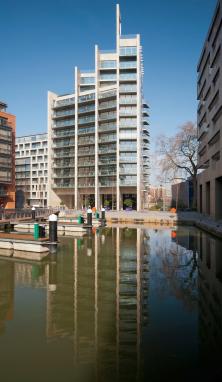Specialist stonework contractor adds Moore House to its St James Group portfolio.
What with the football team and the flower show, Chelsea is very much in the news at the present time. Szerelmey Ltd have returned to the St James Group's Grosvenor Waterside Development in Chelsea to work on the exterior of their second project at the SW1 site.
Grosvenor Waterside is an eclectic example of how good design, contemporary art and affordable housing can all sit comfortably within a prestigious development that includes everything from luxurious penthouse apartments to bat boxes.
The dominant building in the project is obviously Caro Point, named after the sculptor, Sir Anthony Caro. The Grosvenor Waterside project has involved seven architects: MAKE, Broadway Malyan, Sheppard Robson, Twigg Brown Architects, Finlay Harper, Allies & Morrison plus EPR Architects.
Szerelmey worked alongside St James Group and EPR Architects on the design and installation of the Jura Limestone Cladding on Caro Point, which follow the broad design principles for the building set out by Sheppard Robson in their original plan. The exterior of Caro Point consists of 4,300 sq metres of Jura Limestone Cladding which is complimented by a patchwork of coloured laminate panels. The variation in shade and definition of the limestone gives the exterior a subtle variety beyond the obvious colour scheme .
Huge advances in cutting and design has made the use of stone far more adaptable and its inclusion seems to add an aura of solidity and durability to a building regardless of whether it is stone blocks or stone cladding. Stone remains a very specialist material whereby correct specification is paramount as there is not a 'one stone fits all' solution. Szerelmey not only have 150 years experience in cleaning, restoring and installing stonework but also use this knowledge to advise on the correct choice of stone and will design the appropriate fixing system. Attention to detail internally and externally is the central ethos within the whole development and the installation of the Limestone Cladding was certainly important on such a high profile centre piece as Caro Point.
Looking at the project now with its art installations by Clare Wood, Ekkard Altenburger and Richard Wilson which sit amongst the inner dock's swish contemporary buildings, it's hard to imagine the sites industrial heritage. Grosvenor Waterside was formed from the Grosvenor Dock situated at the mouth of the Grosvenor Canal and adjacent to the Grade 11 listed Victorian Western Pumping Station. Whilst it may have taken eight years in the planning, the 917 homes, of which around 30% are designated as affordable housing, remain a commendable example of urban planning. The development has been recognised by BREEAM and Eco Homes for it sustainability.
Following on from their successful collaboration with EPR Architects on Caro Point, Szerelmey were bought back again by St James to work on Moore House. This building consists of a six storey mixed use development bordering Ebury Bridge Road and steps up to ten storeys at the far end where it comes within a walkway of meeting Caro Point . Moore House runs alongside the junction of Ebury Bridge Road and Ebury Street which is the main vehicular access to the Grosvenor Waterside and provides a complete architectural paradox to the Victorian terrace houses it faces.
Unlike Caro Point, the Jura Limestone does not have to share the stage with any other cladding material and is used as a feature to frame the continuous balconies which overlook the public square containing Richard Wilsons 'Shack Stack' sculpture. The 2,300 square metres of Jura Limestone form a composite picture frame on the balconies and gives a contemporary look to all elevations of the building. The Jura Limestone comes from the Bavarian region of Germany and is known for its hardness and marble like qualities. The only 'negative' is its lack of uniformity as it has a very large colour variation, but as in this instance the variety in appearance can be accentuated in the installation to give the various shades their prominence.
Whilst Portland Stone has long been considered 'The London Stone' it is interesting to see other options being used to such good effect and indeed Szerelmey have recently finished a Red Sandstone cladding project at a residential development just 'up the road' in Knightsbridge.
Many architects see the benefits of using a natural material such as stone and with modern methods of cutting, design and installation it has become far more user friendly. Szerelmey can advise on all aspects of its use including New Build, both internally and externally, in addition to stone cleaning and restoration. Advances in design and installation have enabled Szerelmey to add suspended Stone Ceilings to their repertoire of Stone Flooring, including raised flooring.
Whilst this project is complete, there is much 'Moore' to come from Szerelmey.
For advice on specifying stone and its installation visit www.szerelmey.com or call 0207 735 9995




















